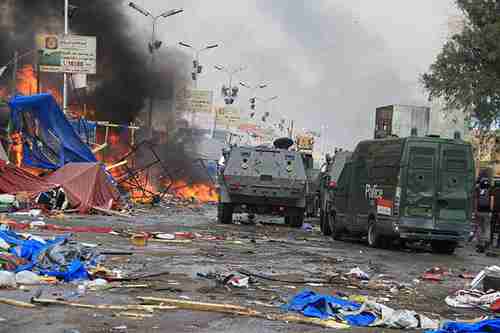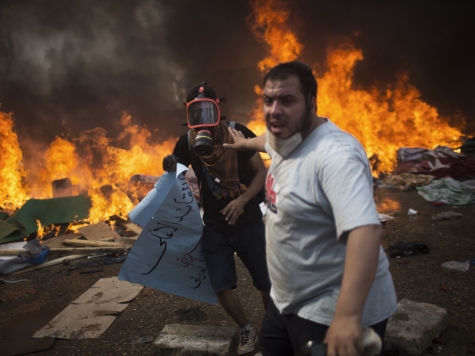
This morning’s key headlines from GenerationalDynamics.com
- Hundreds of casualties in clashes in Egypt
- Egypt declares curfew and month-long state of emergency
- Mohamed ElBaradei resigns from Egypt’s government over violence
- Egypt’s chaos further muddles U.S. Mideast foreign policy
- North and South Korea agree to reopen Kaesong industrial complex
Hundreds of casualties in clashes in Egypt

Egyptian security forces clear a Muslim Brotherhood sit-in in Cairo (AP)
Egypt’s Interior Ministry is saying that almost 100 people were killedand hundreds injured in clashes between the security forces and MuslimBrotherhood (MB) supporters on Wednesday, while MB activists put thenumbers at triple that figure. After six weeks of sit-ins by tens ofthousands of supporters, following the July 3 ouster of presidentMohamed Morsi and his Muslim Brotherhood government, the new army-ledinterim government finally carried through on its repeated threats to
Others are complaining that angry mobs of MB supporters attacked andtorched a number of Christian churches, monasteries, schools and shopsin Alexandria, Suez and other cities.
MB activists are claiming that deaths were all caused by live fire bythe Army and police. The Interior Ministry says that, although almostall MB protesters were peaceful, some fired at the police from hiddenpositions, in order to provoke return fire.
Most reports point to polls that show that most of the population aresick and tired of the MB. They got into office a year ago, governedthe country as dictators, imposing a version of Sharia law that fewwanted, while the country’s economy got worse and worse. And then,when Morsi was ousted, they refused every compromise, and createdpolitical chaos.
However, the MB is still an extremely powerful force in Egypt’spolitics, with some 30% of the population belonging to theorganization. Al-Ahram (Cairo)
Egypt declares curfew and month-long state of emergency
Egypt’s people are quite used to living under a state of emergency.The last one was declared in 1981 after the assassination of presidentAnwar Sadat, and was not lifted until Hosni Mubarak was deposed twoyears ago. Furthermore, the Muslim Brotherhood was an illegalorganization under Mubarak, and so the current status of its membersis familiar territory to them. In fact, probably the reason why theywent so crazy with power when Mohamed Morsi was president is that theydidn’t know how to handle it.
So today’s government declaration of a month-long state of emergencyis quite familiar to Egyptians. What’s new today is that thegovernment has also imposed a dusk-to-dawn curfew on Cairo and 10other provinces, allowing the army to arrest and detain indefinitelyanyone who violates the curfew. Anti-government activists in Cairoclaimed police and soldiers aided by self-styled “popular committees”of civilian vigilantes armed with clubs and machetes enforced thecurfew, searching cars and checking identity cards of people passingthrough makeshift checkpoints made of tires and concrete blocks.Reuters
Mohamed ElBaradei resigns from Egypt’s government over violence
Mohamed ElBaradei, who won the Nobel Peace Prize several years ago forhis work with the United Nations atomic energy agency, had joined thegovernment at the request of the Army, as a moderate-liberal-secularvoice. On Wednesday he resigned, saying:
“It has become hard for me to keep bearingresponsibility for decisions that I did not approve of and warnedagainst their consequences. I cannot be responsible before Godfor a single drop of blood.
It was hoped that the people’s uprising of 30 June would steer thecountry back into the path of achieving the revolution’s goalsafter the dominating, exclusionary policies practiced by thegroups that ruled the country for one of its worst years. This iswhat drove me to accept a government position, but things took adifferent direction where polarization and division reached moredangerous levels and the social fabric faced disintegration.
I believed that there were acceptable peaceful alternatives toresolve our societal confrontation that could have stood a chanceat achieving national reconciliation. Violence begets violence,and mark my words, the only beneficiaries from what happened todayare extremist groups.”
Several analysts said that the interim government should simply haveallowed the sit-in to continue for as many weeks or months as theywanted, with no need for violence. Al-Ahram
Egypt’s chaos further muddles U.S. Mideast foreign policy
Secretary of State John Kerry made a surprise visit to theState Dept.’s press briefing room on Wednesday, and reada statement excerpted below:
“The United States strongly condemns today’s violenceand bloodshed across Egypt. It’s a serious blow to reconciliationand the Egyptian people’s hopes for a transition towards democracyand inclusion. …
Today’s events are deplorable and they run counter to Egyptianaspirations for peace, inclusion, and genuine democracy. Egyptiansinside and outside of the government need to take a stepback. They need to calm the situation and avoid further loss oflife. …
Violence is simply not a solution in Egypt or anywhereelse.”
This is the kind of banal silliness that we’ve come to expect fromKerry, at a time when America’s credibility in the Mideast is at anall time low. Last month, Kerry announced an Afghan “peace process”that collapsed within a day; his Mideast “peace process” is a joke;the Administration’s handling of the violence in Syria, setting onea farce; and then there’s Benghazi.
Kerry’s statement is being viewed with contempt in Egypt because itsay anything about the one question that everyone wants to know: Is itthe opinion of the Obama administration that the July 3 ouster was ato Egypt be terminated. Egyptians on both sides are furious withObama for not taking sides, though I would argue that not taking sidesis the right thing for Obama to do at this time. State Department
North and South Korea agree to reopen Kaesong industrial complex
North and South Korea agreed in principle Wednesday to reopen theirjoing Kaesong industrial complex, after it was closed in April by atemper tantrum from North Korea’s child dictator, Kim Jong-un.However, no date was set for the reopening. North Korea had wanted toreopen Kaesong earlier, without any conditions, because it’s alucrative source of hard currency for the North. South Koreaapparently at least got some sort of promise from the North that theywould not shut it down again “under any circumstances.” At theinsistence of the South, they also agreed to allow foreign investorsto operate in Kaesong, because the South believes that the presence offoreign companies will make it more difficult to shut it down again.Yonhap (Seoul)
Permanent web link to this article
Receive daily World View columns by e-mail

COMMENTS
Please let us know if you're having issues with commenting.